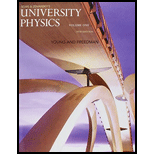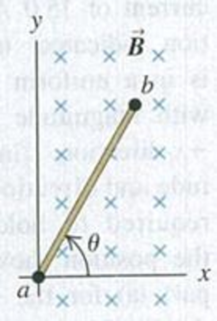
CP A uniform bar has mass 0.0120 kg and is 30.0 cm long. It pivots without friction about an axis perpendicular to the bar at point a (Fig. P27.72). The gravitational force on the bar acts in the −y-direction. The bar is in a uniform magnetic field that is directed into the page and has magnitude B = 0.150 T. (a) What must be the current I in the bar for the bar to be in
Figure P27.72

Want to see the full answer?
Check out a sample textbook solution
Chapter 27 Solutions
University Physics with Modern Physics, Volume 1 (Chs. 1-20) (14th Edition)
Additional Science Textbook Solutions
Organic Chemistry (8th Edition)
Cosmic Perspective Fundamentals
Microbiology: An Introduction
Genetic Analysis: An Integrated Approach (3rd Edition)
Campbell Biology (11th Edition)
- Can someone help me answer this thank you.arrow_forward1.21 A postal employee drives a delivery truck along the route shown in Fig. E1.21. Determine the magnitude and direction of the resultant displacement by drawing a scale diagram. (See also Exercise 1.28 for a different approach.) Figure E1.21 START 2.6 km 4.0 km 3.1 km STOParrow_forwardhelp because i am so lost and it should look something like the picturearrow_forward
- 3.31 A Ferris wheel with radius Figure E3.31 14.0 m is turning about a horizontal axis through its center (Fig. E3.31). The linear speed of a passenger on the rim is constant and equal to 6.00 m/s. What are the magnitude and direction of the passenger's acceleration as she passes through (a) the lowest point in her circular motion and (b) the high- est point in her circular motion? (c) How much time does it take the Ferris wheel to make one revolution?arrow_forward1.56 ⚫. Three horizontal ropes pull on a large stone stuck in the ground, producing the vector forces A, B, and C shown in Fig. P1.56. Find the magnitude and direction of a fourth force on the stone that will make the vector sum of the four forces zero. Figure P1.56 B(80.0 N) 30.0 A (100.0 N) 53.0° C (40.0 N) 30.0°arrow_forward1.39 Given two vectors A = -2.00 +3.00 +4.00 and B=3.00 +1.00 -3.00k. (a) find the magnitude of each vector; (b) use unit vectors to write an expression for the vector difference A - B; and (c) find the magnitude of the vector difference A - B. Is this the same as the magnitude of B - Ä? Explain.arrow_forward
- 5. The radius of a circle is 5.5 cm. (a) What is the circumference in meters? (b) What is its area in square meters? 6. Using the generic triangle below, solve the following: 0 = 55 and c = 32 m, solve for a and b. a = 250 m and b = 180 m, solve for the angle and c. b=104 cm and c = 65 cm, solve for a and the angle b a 7. Consider the figure below representing the Temperature (T in degrees Celsius) as a function of time t (in seconds) 4 12 20 (a) What is the area under the curve in the figure below? (b) The area under the graph can be calculated using integrals or derivatives? (c) During what interval is the derivative of temperature with respect to time equal to zero?arrow_forwardPart 3: Symbolic Algebra Often problems in science and engineering are done with variables only. Don't let the different letters confuse you. Manipulate them algebraically as though they were numbers. 1. Solve 3x-7= x + 3 for x 2x-1 2. Solve- for x 2+2 In questions 3-11 solve for the required symbol/letter 3. v2 +2a(s-80), a = = 4. B= Ho I 2π r 5. K = kz² 6.xm= MAL ,d= d 7.T, 2 = 8.F=Gm 9. mgh=mv² 10.qV = mu² 80 12. Suppose that the height in meters of a thrown ball after t seconds is given by h =6+4t-t². Complete the square to find the highest point and the time when this happens. 13. Solve by completing the square c₁t² + cat + 3 = 0. 14. Solve for the time t in the following expression = 0 + vot+at²arrow_forwardA blacksmith cools a 1.60 kg chunk of iron, initially at a temperature of 650.0° C, by trickling 30.0°C water over it. All the water boils away, and the iron ends up at a temperature of 120.0° C. For related problem-solving tips and strategies, you may want to view a Video Tutor Solution of Changes in both temperature and phase. Part A How much water did the blacksmith trickle over the iron? Express your answer with the appropriate units. HÅ mwater = Value 0 ? Units Submit Request Answerarrow_forward
- Steel train rails are laid in 13.0-m-long segments placed end to end. The rails are laid on a winter day when their temperature is -6.0° C. Part A How much space must be left between adjacent rails if they are just to touch on a summer day when their temperature is 32.0°C? Express your answer with the appropriate units. ☐ о μΑ ? D = Value Units Submit Previous Answers Request Answer × Incorrect; Try Again; 3 attempts remaining Al Study Tools Looking for some guidance? Let's work through a few related practice questions before you go back to the real thing. This won't impact your score, so stop at anytime and ask for clarification whenever you need it. Ready to give it a try? Start Part B If the rails are originally laid in contact, what is the stress in them on a summer day when their temperature is 32.0°C? Express your answer in pascals. Enter positive value if the stress is tensile and negative value if the stress is compressive. F A Ο ΑΣΦ ? Раarrow_forwardhelp me with this and the step I am so confused. It should look something like the figure i shownarrow_forwardPart A In an effort to stay awake for an all-night study session, a student makes a cup of coffee by first placing a 200 W electric immersion heater in 0.250 kg of water. How much heat must be added to the water to raise its temperature from 20.5° C to 95.0°C? Express your answer in joules. ΕΠΙ ΑΣΦ Q Submit Request Answer Part B ? J How much time is required? Assume that all of the heater's power goes into heating the water. Express your answer in seconds. VG ΑΣΦ ? t = Sarrow_forward
 Principles of Physics: A Calculus-Based TextPhysicsISBN:9781133104261Author:Raymond A. Serway, John W. JewettPublisher:Cengage Learning
Principles of Physics: A Calculus-Based TextPhysicsISBN:9781133104261Author:Raymond A. Serway, John W. JewettPublisher:Cengage Learning Physics for Scientists and Engineers with Modern ...PhysicsISBN:9781337553292Author:Raymond A. Serway, John W. JewettPublisher:Cengage Learning
Physics for Scientists and Engineers with Modern ...PhysicsISBN:9781337553292Author:Raymond A. Serway, John W. JewettPublisher:Cengage Learning College PhysicsPhysicsISBN:9781305952300Author:Raymond A. Serway, Chris VuillePublisher:Cengage Learning
College PhysicsPhysicsISBN:9781305952300Author:Raymond A. Serway, Chris VuillePublisher:Cengage Learning College PhysicsPhysicsISBN:9781285737027Author:Raymond A. Serway, Chris VuillePublisher:Cengage Learning
College PhysicsPhysicsISBN:9781285737027Author:Raymond A. Serway, Chris VuillePublisher:Cengage Learning Physics for Scientists and Engineers: Foundations...PhysicsISBN:9781133939146Author:Katz, Debora M.Publisher:Cengage Learning
Physics for Scientists and Engineers: Foundations...PhysicsISBN:9781133939146Author:Katz, Debora M.Publisher:Cengage Learning





